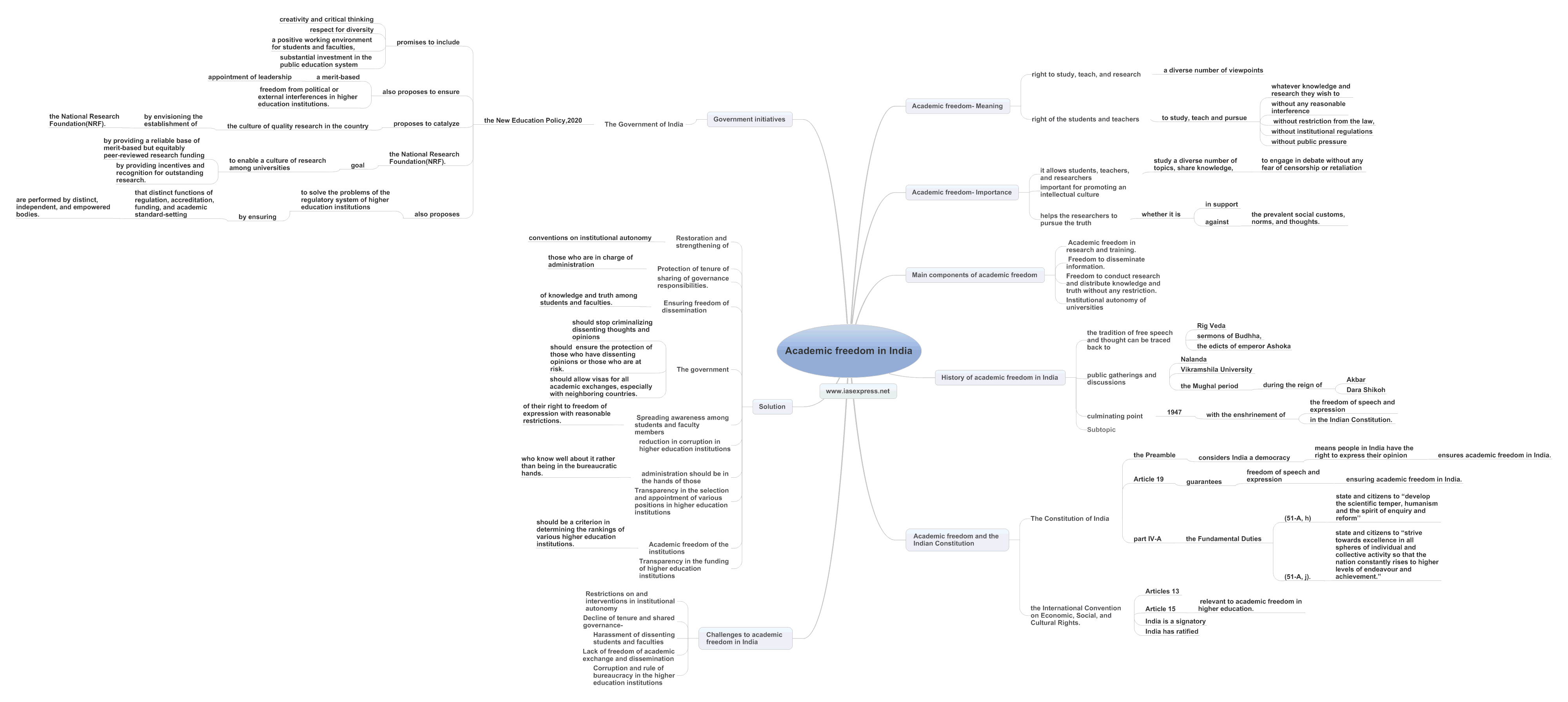Academic freedom in India – Importance, Challenges and Way forward

From Current Affairs Notes for UPSC » Editorials & In-depths » This topic
IAS EXPRESS Vs UPSC Prelims 2024: 85+ questions reflected
In recent times, freedom in India and its various aspects have come into question many a time. Such an aspect of freedom that comes into question time and again is academic freedom in India. Many scholars, researchers, and academicians complain about their diminishing rights to express what they consider needs to be heard and known. India’s score in the Academic Freedom Index(AFI), 2020 was abysmally low and its scores were close to countries like Saudi Arabia and Libya. Similarly, the Scholars at Risk network in its Free to Think Report,2020 showed a dismal condition of academic freedom in India. In such a situation, academic freedom in India and its various aspects need to be studied deeply to find a way out of this crisis and pave the way for a healthy academic environment in India.
Academic freedom- Meaning
Academic freedom refers to the right to study, teach, and research a diverse number of viewpoints. It is the right of the students and teachers to study, teach and pursue whatever knowledge and research they wish to without any reasonable interference, restriction from the law, institutional regulations, or public pressure.
Academic freedom- Importance
Academic freedom is important because it allows students, teachers, and researchers to study a diverse number of topics, share knowledge, to engage in debate without any fear of censorship or retaliation. It is important for promoting an intellectual culture. It helps the researchers to pursue the truth- whether it is in support or against the prevalent social customs, norms, and thoughts.
Main components of academic freedom
- Academic freedom in research and training.
- Freedom to disseminate information.
- Freedom to conduct research and distribute knowledge and truth without any restriction.
- Institutional autonomy of universities.
History of academic freedom in India
In India, the tradition of free speech and thought can be traced back to Rig Veda, sermons of Budhha, and the edicts of emperor Ashoka. The public gatherings and discussions in the Nalanda and Vikramshila University in ancient India are such examples. This continued in the Mughal period also during the reign of Akbar and Dara Shikoh. The idea of academic freedom reached a culminating point in 1947 with the enshrinement of the freedom of speech and expression in the Indian Constitution.
Academic freedom and the Indian Constitution
- The Constitution of India in the Preamble considers India a democracy which means people in India have the right to express their opinion in various matters which in turn ensures academic freedom in India.
- Article 19 of the Indian Constitution guarantees freedom of speech and expression thus ensuring academic freedom in India.
- The Fundamental Duties in part IV-A of the Indian Constitution lays down that it is one of the fundamental duties of the state and citizens to “develop the scientific temper, humanism and the spirit of inquiry and reform’’(51-A, h) and to “strive towards excellence in all spheres of individual and collective activity so that the nation constantly rises to higher levels of endeavor and achievement.” (51-A, j). Both of these provisions of the Constitution promote academic freedom in India.
- India is a signatory to and has ratified the International Convention on Economic, Social, and Cultural Rights. Articles 13 and 15 of this Convention are relevant to academic freedom in higher education.
Challenges to academic freedom in India
- Restrictions on and interventions in institutional autonomy– Different spheres of institutional autonomy face restrictions in terms of the selection of university leaders or vice-chancellors, selection of faculty, selection of students, framing of courses, and several other aspects of the university.
- The decline of tenure and shared governance– There is a lack of protection of tenure for faculties and even tenured faculties are losing power as authorities and administrators as they have to work according to the whims of legislators.
- Harassment of dissenting students and faculties– Those who dissent or have an opposite opinion against the prevalent thought-process are harassed in various ways by the public and institutions. The cases of rustication, expulsion, and withholding of scholarships are increasing day by day.
- Lack of freedom of academic exchange and dissemination– It is difficult in India to exchange students and faculties. Denial of visas to foreign students(especially students from China and Pakistan) is one such problem or those who seek visas have to go through a hefty process.
- Corruption and rule of bureaucracy in the higher education institutions– It has been noticed that corrupt practices and the working of bureaucracy for those who are in power are plaguing academic freedom in India at various levels.
Solution
- Restoration and strengthening of conventions on institutional autonomy is one such measure that can ensure academic freedom in India.
- Protection of tenure of those who are in charge of administration and sharing of governance responsibilities.
- Ensuring freedom of dissemination of knowledge and truth among students and faculties.
- The government should stop criminalizing dissenting thoughts and opinions and ensure the protection of those who have dissenting opinions or those who are at risk.
- The government should allow visas for all academic exchanges, especially with neighboring countries.
- Spreading awareness among students and faculty members of their right to freedom of expression with reasonable restrictions.
- There should be a reduction in corruption in higher education institutions and the administration should be in the hands of those who know well about it rather than being in the bureaucratic hands.
- Transparency in the selection and appointment of various positions in higher education institutions can ensure their autonomy.
- Academic freedom of the institutions should be a criterion in determining the rankings of various higher education institutions.
- Transparency in the funding of higher education institutions can also promote academic freedom in India.
Government initiatives
- The Government of India in the New Education Policy(2020) promises to include creativity and critical thinking, respect for diversity, a positive working environment for students and faculties, and substantial investment in the public education system as its pillars.
- It also proposes to ensure a merit-based appointment of leadership and freedom from political or external interferences in higher education institutions.
- The Policy proposes to catalyze the culture of quality research in the country by envisioning the establishment of the National Research Foundation(NRF). The goal of the NRF will be to enable a culture of research among universities by providing a reliable base of merit-based but equitably peer-reviewed research funding and by providing incentives and recognition for outstanding research.
- The NEP, 2020 also proposes to solve the problems of the regulatory system of higher education institutions which include the concentration of power, conflict of interests, and accountability by ensuring that distinct functions of regulation, accreditation, funding, and academic standard-setting are performed by distinct, independent, and empowered bodies.
Way forward
India is a diverse country with people from different cultures, different backgrounds, and different thoughts living together. Freedom of speech and thought in India has its place right from the ancient Indian tradition in the coexistence of wide diversity of views in Indian society. Academic freedom protects such coexistence of a wide variety of opinions in an environment. It protects the right to have opposing views and the right to scrutinize the existing thought-system to seek truth and knowledge. Academic freedom in India is constantly facing internal and external threats. In such a situation, it becomes essential that faculties, students, and their opinions are respected and such forces are put to a halt who try to threaten academic freedom in India. As we know, academic practices are sustained within academic institutions, and therefore, there is a need to protect the autonomy of the institutions. Academic freedom is not only related to human rights but also to social justice and thus, it needs to be protected.
Practise Question
Q: Comment on the various aspects of academic freedom in India and suggest measures to protect and promote it in the present scenario.
If you like this post, please share your feedback in the comments section below so that we will upload more posts like this.



Good
Very well drafted.